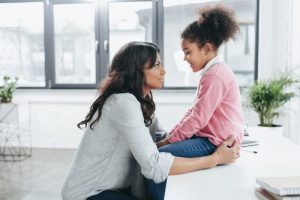
“If you don’t listen eagerly to the little stuff when they are little, they won’t tell you the big stuff when they are big, because to them all of it has always been big stuff.” C.M Wallace
I had the pleasure of reading this quote the other day. It reminded me why we need to be listening to our children. “Children get a voice not a vote,” has been my moto when I counsel children and adolescents. I truly believe this. Children need to feel heard and validated especially during times of change such as divorce and second marriages. Here are my top 5 reasons they need a voice.
- Our children are grieving, too. When a marriage ends, children grieve the death of their parent’ marital relationship, too. Feeling heard during the divorce allows them to have a small moment of control during a time when they are truly powerless. Children typically tell me they know they can’t keep their parents together but having a place to share their grief without hurting their mom and dad is valuable.
- Our children have fears of the unknown. Children and teens don’t usually have a neutral adult in their life to ask questions. When they can identify their fear and find a solution, this allows for them to begin healing. Children and teens need an adult to explain divorce, time sharing schedules, etc. without hearing negative or disparaging comments about either parent. They also need adult information in a healthy, age appropriate way. In my experience, it’s much harder for parents and loved ones to answer these tough questions without oversharing adult information and exacerbating fears.
- Children and teens like having an opportunity to share how they’d like to spend their time between two homes. I have learned over the years that kids don’t attend therapy with a time-sharing schedule in mind. They have ideas that make sense to them, based on their school and extra-curriculars. They usually share which days are easier transition days or how many nights they can imagine being without the other parent. “How many sleeps can you have with one parent before you feel you need to see your other parent?” This is my favorite way to ask children to think about time-sharing schedules without planting a seed of any one parenting schedule.
- Children want to express when they feel in the middle, stressed to tell the truth or fear they will hurt one or both of their parent’s feelings. Children and teens have told me when they have a parent begin a relationship or getting married, they talk freely about loyalty. Kids know they can’t make their parent’s relationship come to an end, they just want their concerns addressed, be put at ease, know its ok to love everyone and it won’t hurt their other parent’s feelings. Children and teens usually need help facilitating this difficult conversation so to ease their fear of having to choose.
- Divorce is hard on adults, its hard on our children. We want our children to tell us their feelings, needs, wants and desires. I go back to my new favorite quote, we have to listen to the little stuff, so they will tell us the big stuff. In the eyes of a child, not much in life is bigger than divorce. If we want our teens to tell us about bullying, peer pressure, drugs and alcohol, or sex, they need to know their voice matters. In times of stress children need to know that turning to their parents is always their best option. Giving them a safe place to share their voice, helps to ensure, they will share again.
Jennifer Leister, LPCS is a Licensed Professional Counselor and Supervisor, a parenting coordinator, and expert in reunification therapy. She has 17 years of clinical experience, with expertise in family therapy, child and adolescence therapy. Her clinical work is primarily focused in divorce, blended family, and high conflict family dynamics. She also specializes in Attention Deficit Hyperactivity Disorder, Oppositional Defiant Disorder, Anxiety, and Mood Disorders. When she is a team member in Collaborative Divorce, she serves in the roles of Neutral Mental Health Professional and Child Specialist. She has authored two children’s books in 2014: “Meet Max Learning about Divorce from a Basset Hound’s Perspective” and “Max Meets Emma Learning about Blended Families from a Basset Hound’s Perspective”. She lectures and trains state wide, including as the Keynote Speaker for the Texas State Bar Collaborative Section, has made radio appearances, and is a member of CDT, IACP, and AFCC.
